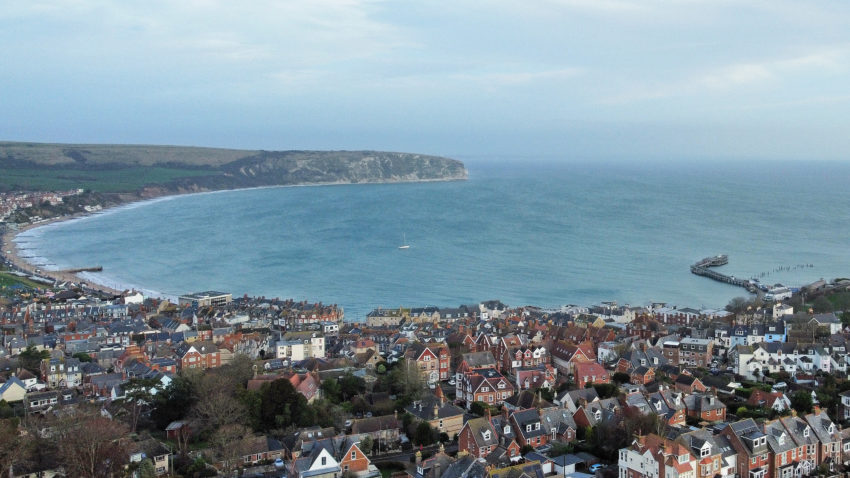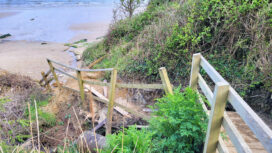With the sea being one of Swanage’s most valuable assets, the town council is looking to ensure all its future decisions promote an improvement in the health of our ocean for both nature and people.
Councillors voted in favour of declaring an urgent need for ocean recovery and to adopt a Motion for the Ocean at a meeting of the Swanage Town Council’s environment and green spaces committee on Wednesday 28th February 2024. The proposal will now go to a meeting of the full council for approval.
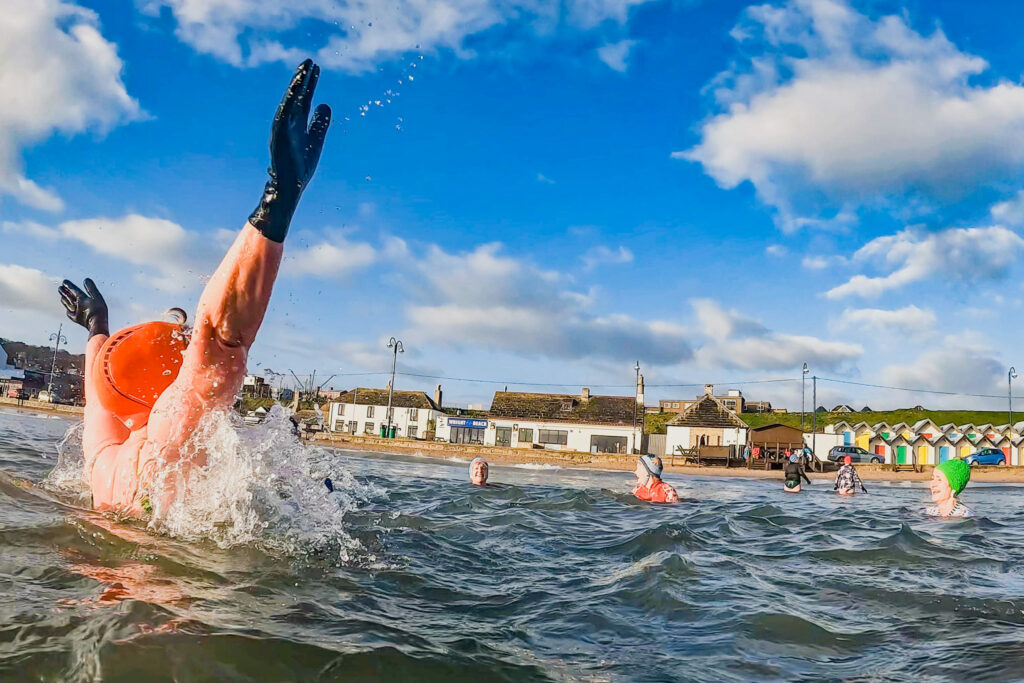
Sea swimming is one of Swanage’s most popular activities
More ecologically healthy sea
A Motion for the Ocean – or an ocean recovery declaration – seeks to help all local governments, both coastal and inland, identify ways they can support a more ecologically healthy sea and to rethink how the ocean is taken into account in their planning and decision making.
Key actions can include working with partners to improve water quality, working with the fishing industry to improve sustainability, taking measures to reduce litter getting into the sea, giving children the chance to experience the ocean first hand, and lobbying the UK Government on the issues it can influence like strengthening regulations around single use plastics.
So far, 25 councils have made the declaration including Blandford Forum Town Council, Falmouth Town Council and Cornwall County Council.
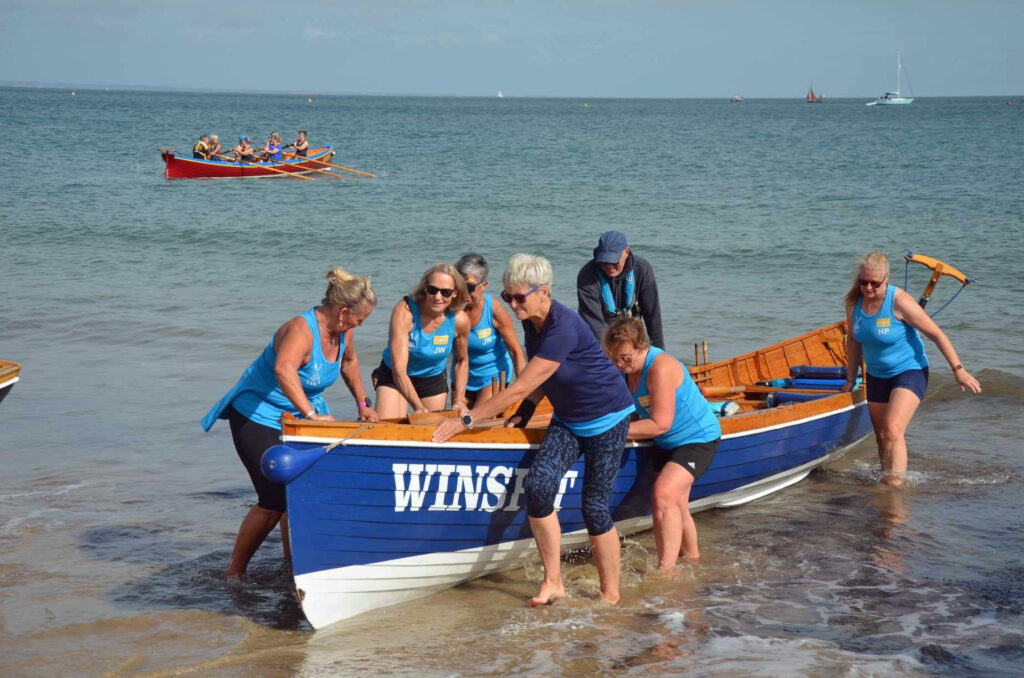
Water quality in Swanage Bay is important for activities like sea rowing
Latest water quality information
Also discussed at the meeting was a report on the water quality in Swanage Bay. The most recent classification by the Environment Agency of the water quality is ‘excellent’, based on weekly samples taken from 2019 through to 2023, during what it calls the bathing season from May to September.
One of the main reasons for any temporary deterioration in water quality is storm sewage overflowing into Swanage Bay during periods of heavy rainfall. Wessex Water reports the spills to the town council and this is also the data that Surfers Against Sewage uses for its pollution alert app.
Bathing water quality is also affected by polluted runoff from fields and the bacteria that get washed into rivers and streams that then travel to the sea.
From May to September, the Environment Agency takes all the data into account including the effects of rain, tide and seasonality and makes a daily pollution risk forecast. When its computer modelling concludes that the pollution risk is high, Swanage Town Council displays advisory signs along the seafront.
The latest data from Wessex Water shows that from October 2022 to September 2023 there were eight storm sewage spills during the winter and five during the summer for a total of 749 minutes.
High pollution risk signs, based on Environment Agency forecasting, were deployed for a total of five days from May to September 2023. Pollution forecasts aren’t issued over the winter from October to April so no signs are deployed, but that doesn’t necessarily mean there’s no pollution, just that no data is issued over this period.
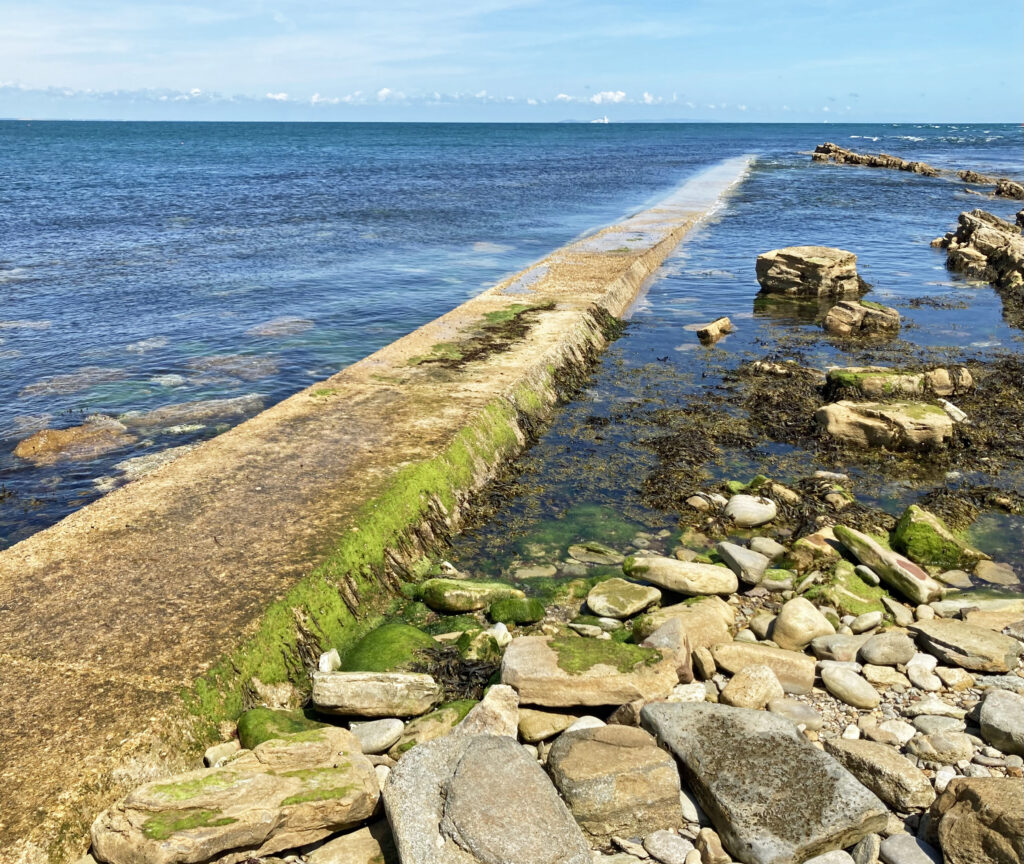
The storm overflow at Peveril Point is the most used outlet as it is further away from the beach
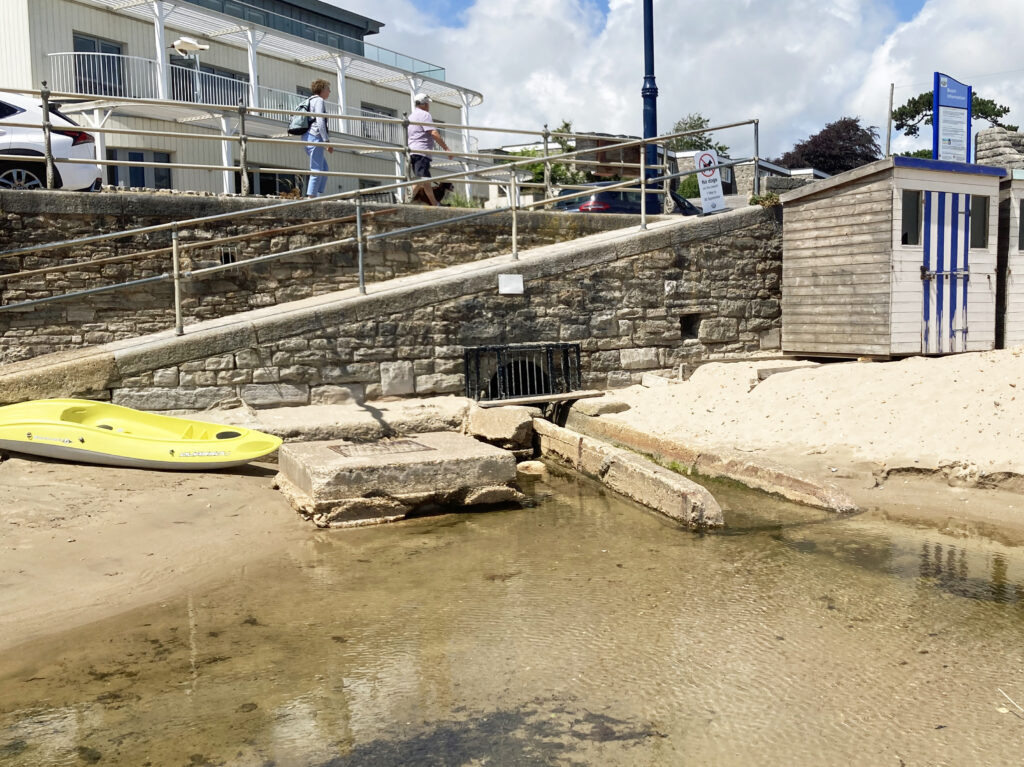
The storm overflow at Ocean Bay is the second most used outlet when heavy rainfull is overwhelming the sewer system
Swanage pollution data
- October 2020 to September 2021: 16 winter spills, 6 summer spills, total minutes 1398, 14 affected days according to Wessex Water data, 5 days signs displayed advising against bathing based on Environment Agency data
- October 2021 to September 2022: 8 winter spills, 5 summer spills, total minutes 340, 7 affected days according to Wessex Water data, 6 days signs displayed advising against bathing based on Environment Agency data
- October 2022 to September 2023: 8 winter spills, 5 summer spills, total minutes 749, 8 affected days according to Wessex Water data, 5 days signs displayed advising against bathing based on Environment Agency data
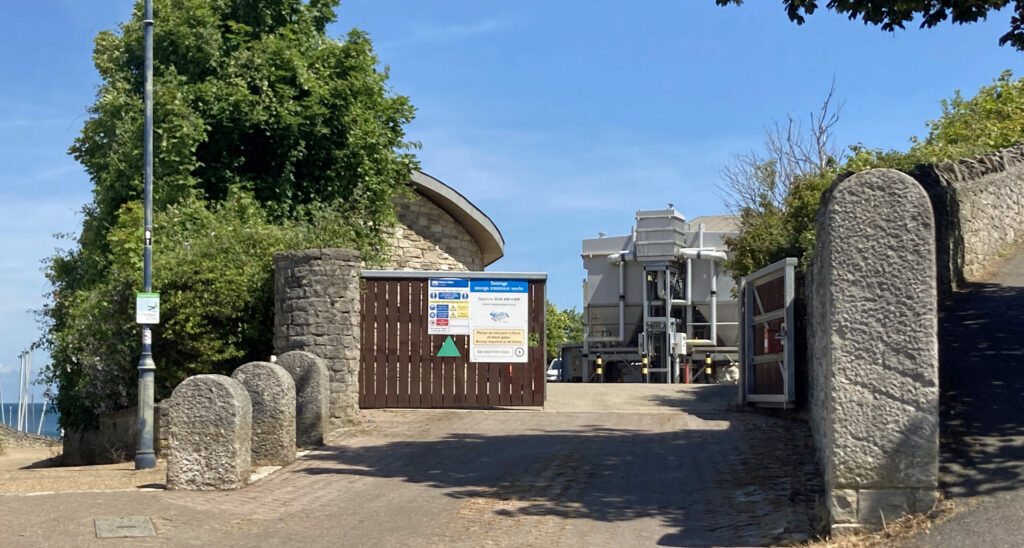
The entrance to Wessex Water’s Swanage sewage works which was built in 2000
Pressure on Wessex Water
Chairing the meeting, councillor Chris Moreton agreed that the council should continue to keep up the pressure on Wessex Water to reduce the number of storm sewage spills, in particular from the overflow outlet at Ocean Bay as this flows directly onto the beach.
Wessex Water has already announced it’s planning to allocate money in its budget from 2025 to reduce the use of the Ocean Bay and Peveril Point outlet pipes.
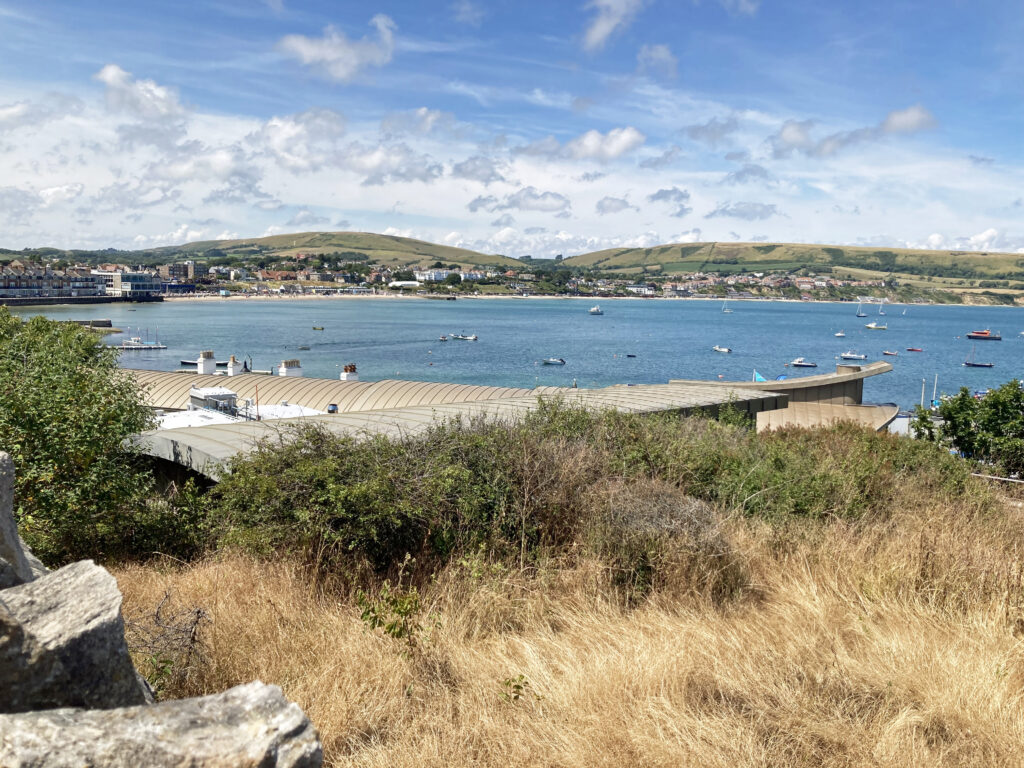
The sea view from the roof of the Swanage sewage works
Draft Motion for the Ocean
Swanage Town Council declares an urgent need for Ocean Recovery.
We recognise that we need ocean recovery to meet our net zero carbon targets, and we need net zero carbon to recover our ocean.
This council pledges to:
- Report to full council within 12 months on the actions and projects that will begin an ocean recovery in Swanage.
- Embed ocean recovery in all strategic decisions, plans, budgets, procurement and approaches to decisions by the council (particularly in planning, regeneration, skills and economic policy), aligning with climate change mitigation and adaptation requirements, and considering ocean-based solutions in our journey towards a carbon neutral and climate resilient future.
- Ensure that local planning supports ocean recovery, working closely with the Marine Management Organisation to embed strong links between any Local Plan and Marine Plan to support ocean recovery.
- Ensure that our nature, biodiversity and climate strategies, such as the Local Nature Recovery Strategy, recognise how land and rivers connect to and impact the ocean and strive to support ocean recovery through a source-to-sea approach.
- Work with partners locally and nationally to deliver improved water quality and increased sustainability in marine industries, and to develop a sustainable and equitable blue economy that delivers ocean recovery and local prosperity; including the local fishing industry and the vital work of the Inshore Fisheries and Conservation Authorities.
- Grow ocean literacy and marine citizenship in Swanage, including:
- Ensuring all pupils are given the opportunity to experience the ocean first-hand before leaving primary school – striving to include homeschooled children
- Promoting sustainable and equitable access to the ocean through physical and digital experiences for all residents.
- Through these actions, embed understanding of the ‘source-to-sea’ approach and how all people, wherever they live, impact and are impacted by ocean health.
- Use the council website and other communication channels to update on ocean recovery progress, and signpost to ocean literacy development opportunities and marine citizenship pledges.
- Write to the government asking them to put the ocean into net recovery by 2030 by:
- Ensuring Inshore Fisheries and Conservation Authorities have the resources they need to effectively research and monitor our growing number of marine protected areas, and to set and enforce appropriate fishing levels that support local economies and deliver environmental sustainability
- Working with coastal, estuarine and maritime communities to co-develop marine policy to ensure it delivers equitable and sustainable outcomes in local placemaking
- Appointing a dedicated Minister for the Coast
- Embedding ocean and civic literacy into the national curriculum
- Stopping plastic pollution at source by strengthening the regulations around single-use plastics and set standards for microfibre-catching filters to ensure that all new domestic and commercial washing machines are fitted with a filter that captures a high percentage of microfibres produced in the wash cycle and support the solutions needed to address the threat posed by historic coastal landfill sites
- Improving the water quality of our rivers, estuarine and coastal waters leading to the ocean to benefit nature and the health and wellbeing of all UK residents, including by stopping the regular pollution of our rivers and seas
- And by listening to marine and social scientific advice to update the Marine Policy Statement and produce a national Ocean Recovery Strategy which will:
- Enable the recovery of marine ecosystems rather than managing degraded or altered habitats in their reduced state
- Consider levelling up, marine conservation, energy, industrial growth, flood and coastal erosion risk management, climate adaptation and fisheries policy holistically rather than as competing interests
- Develop a smarter approach to managing the health of the entire ocean that moves beyond Marine Protected Areas and enables links to be made across sectors towards sustainability
- Establish improved processes for understanding the benefits of ocean recovery, leaving no doubt the links between this and human lives, livelihoods, and wellbeing
Watch an Ocean Conservation Trust film about a Motion for the Ocean
Further information
- Council meeting background papers – see Page 15 for the water quality report and page 21 for the Motion for the Ocean information
- Environment Agency 2023 Bathing Water Profile for Swanage Central
- More about Motion for the Ocean from the Ocean Conservation Trust
- Behind the scenes at Swanage sewage works
